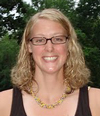I started out as a Biology major with an Environmental Studies concentration, but then switched to a Biology and ES double major my junior year because there was so much overlap in courses. I chose the natural science track in ES because I really like the sciences, especially biology (I also majored in Biology). I don’t know if I really had a main interest when I was at St. Olaf – I just really enjoyed learning about the natural world and how it works.
Many of my ES courses seemed to focus on environmental problems – what is causing them and how we can solve them. The push for solving these problems was often focused on the environment rather than society, which frustrated me because nearly all the environmental problems are directly tied to social problems such as poverty, so solutions for the two inter-connected problems should be developed together. I really didn’t have any idea how I could make these two fields fit together for a career, though. I did two summer research internships in biology, the second of which I used for my ES experiential component. I conducted research on zebra mussels and how they are affecting lakes in northern Michigan. While this research had a social component to it – since zebra mussel invasion in these lakes as well as the Great Lakes affects commercial fishing and transport as well as tourism – I was interested in working on an environmental problem with a little bigger scope and social impact. Back on campus I was involved with the Biology Club and Environmental Coalition, which helped me connect with other students with similar interests as well as participate in various service opportunities that helped me explore various ways I can put my interests and passions into action to create positive change. Throughout most of my St. Olaf career I had planned on going into graduate school immediately upon graduation for ecology or some related field. However, toward the end of my junior year and during the summer before my senior year I realized I really wanted to do something more directly beneficial to society, so right away in the fall of my senior year I began looking into different options to do that. I did a lot of research online as well as talked with quite a few of my professors at St. Olaf.
I ended up applying to the Peace Corps, a couple companies, and 5 graduate schools – four that were connected to the Peace Corps in their Master’s International program, and one straight-up Master’s program. During my senior Katie Godfrey and I created a cookbook focused on local food, which got me thinking more about how agriculture is related to environmental and social problems. For my independent project during my senior capstone ES class I did more thorough research on the relationship between agriculture and environmental and social problems. Without knowing it, I was setting myself up to start down a path I never could have predicted I would head down. In the spring of my senior year, I decided to do the Peace Corps Master’s International program at Cornell University for graduate school in their International Agriculture and Rural Development field. Last year I took classes at Cornell and then in mid-August 2009 I left for Senegal to start my Peace Corps service. I have been in Senegal for almost 6 months now and can definitely see how I will be able to put my education and passion to work to improve agricultural practices here, thereby helping to solve social and environmental problems.
Link to Danielle’s Peace Corp Blog here.
